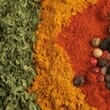Background
- Turmeric is a spice, commonly used in Asian food, derived from the root of the turmeric (Curcuma longa) plant. Curcumin is the yellow-colored primary active constituent derived from turmeric and is commonly used to color foods and cosmetics.
- The rhizome (root) of turmeric has long been used in traditional Asian medicine to treat gastrointestinal upset, arthritic pain, and "low energy." Although not well studied in humans, turmeric and its constituent curcumin have demonstrated anti-inflammatory, antioxidant, nerve protective, insecticidal, and anticancer properties. Preliminary human evidence suggests possible efficacy for dyspepsia (heartburn), high cholesterol, and scabies (when used on the skin).
References
Natural Standard developed the above evidence-based information based on a thorough systematic review of the available scientific articles. For comprehensive information about alternative and complementary therapies on the professional level, go to . Selected references are listed below.
- Aggarwal BB, Kunnumakkara AB, Harikumar KB, et al. Potential of spice-derived phytochemicals for cancer prevention. Planta Med 2008 Oct;74(13):1560-9.
View Abstract - Aggarwal BB, Kumar A, Bharti AC. Anticancer potential of curcumin: preclinical and clinical studies. Anticancer Res 2003;23(1A):363-398.
View Abstract - Adhvaryu MR, Reddy NM, Vakharia BC. Prevention of hepatotoxicity due to anti tuberculosis treatment: a novel integrative approach. World J Gastroenterol 2008 Aug 14;14(30):4753-62.
View Abstract - Brinkhaus B, Hentschel C, Von Keudell C, et al. Herbal medicine with curcuma and fumitory in the treatment of irritable bowel syndrome: a randomized, placebo-controlled, double-blind clinical trial. Scand J Gastroenterol 2005 Aug;40(8):936-43.
View Abstract - Deodhar SD, Sethi R, Srimal RC. Preliminary study on antirheumatic activity of curcumin (diferuloyl methane). Indian J Med Res 1980;71:632-634.
View Abstract - Egan ME, Pearson M, Weiner S, et al. Curcumin, a major constituent of turmeric, corrects cystic fibrosis defects. Science 4-23-2004;304(5670):600-602.
View Abstract - Epstein J, Sanderson IR, Macdonald TT. Curcumin as a therapeutic agent: the evidence from in vitro, animal and human studies. Br J Nutr 2010:103(11):1545-57.
View Abstract - Kositchaiwat C, Kositchaiwat S, Havanondha J. Curcuma longa Linn. in the treatment of gastric ulcer comparison to liquid antacid: a controlled clinical trial. J Med Assoc Thai 1993;76(11):601-605.
View Abstract - Limtrakul P, Anuchapreeda S, Buddhasukh D. Modulation of human multidrug-resistance MDR-1 gene by natural curcuminoids. BMC Cancer 4-17-2004;4(1):13.
View Abstract - López-Lázaro M. Anticancer and carcinogenic properties of curcumin: considerations for its clinical development as a cancer chemopreventive and chemotherapeutic agent. Mol Nutr Food Res 2008 Jun;52 Suppl 1:S103-27.
View Abstract - Prusty BK, Das BC. Constitutive activation of transcription factor AP-1 in cervical cancer and suppression of human papillomavirus (HPV) transcription and AP-1 activity in HeLa cells by curcumin. Int J Cancer 3-1-2005;113(6):951-960.
View Abstract - Rithaporn T, Monga M, Rajasekaran M. Curcumin: a potential vaginal contraceptive. Contraception 2003;68(3):219-223.
View Abstract - Strimpakos AS, Sharma RA. Curcumin: preventive and therapeutic properties in laboratory studies and clinical trials. Antioxid Redox Signal 2008 Mar;10(3):511-45.
View Abstract - Taher MM, Lammering G, Hershey C, et al. Curcumin inhibits ultraviolet light induced human immunodeficiency virus gene expression. Mol Cell Biochem 2003;254(1-2):289-297.
View Abstract - Usharani P, Mateen AA, Naidu MU, et al. Effect of NCB-02, atorvastatin and placebo on endothelial function, oxidative stress and inflammatory markers in patients with type 2 diabetes mellitus: a randomized, parallel-group, placebo-controlled, 8-week study. Drugs R D 2008;9(4):243-50.
View Abstract







